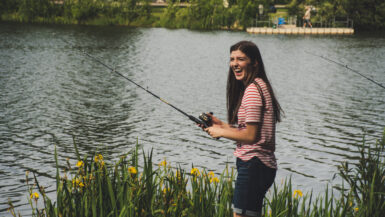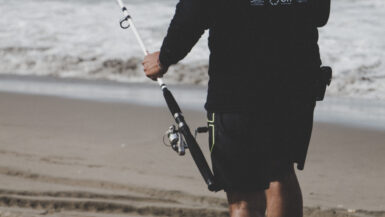Fishing for musky in shallow water is one of the more rewarding yet challenging experiences an angler can have. Whether you’re a seasoned veteran looking to bag your next trophy fish or just getting into the sport of musky fishing, understanding the best lures for catching musky in shallow waters will help you land the big one. In this article, we’ll explore the best lures for fishing for musky in shallow water so you can make your time on the water more productive and fun.
What is a Musky?
Musky, or muskellunge, are one of the largest species of predatory fish in North America. They are found in lakes and rivers throughout the Great Lakes region, and can grow to be up to six feet in length. They are aggressive hunters that feed on smaller fish, frogs, and crayfish.
Musky fishing is becoming increasingly popular as anglers are drawn to their thrilling fight and impressive size. While catching musky can be a challenge, understanding the basics of musky fishing and learning some of the best lures for shallow water fishing can give anglers an edge.
Identifying Musky in Shallow Water
Musky can be found in water as shallow as a few feet, although they are often more abundant near deeper structure. Anglers should look for signs of musky activity such as surface feeding, tail-slapping, or splashing. Additionally, musky can be identified by the spotted pattern on their sides, the long and pointed snout, and the light and dark stripes along the length of their bodies.
How to Catch Musky in Shallow Water
While there are a variety of lures and techniques that can be used to catch musky, some of the best lures for shallow water fishing are spinnerbaits, crankbaits, and topwater lures.
Spinnerbaits are artificial lures with one or more spinning blades that imitate the movement of small fish. These lures are great for musky because they can generate a lot of vibration and noise, which often attract these aggressive predators. Crankbaits are hard-bodied lures that imitate the movement of baitfish. They can be fished deep or shallow, making them a versatile option for musky fishing. Topwater lures, such as poppers and buzzbaits, are also effective for shallow water fishing. These lures will create a disturbance on the water surface, which can draw musky in from a distance.
Tips for Catching Musky in Shallow Water
When fishing for musky in shallow water, anglers should keep a few key tips in mind. First, when casting, be sure to make long casts and cover a lot of water. Musky can be quite sensitive to noise and motion, so move slowly and deliberately when casting. Additionally, use lures that are weighted to reach the desired depth quickly, as musky will often attack a lure before it has time to sink. Finally, be sure to have the right tackle when fishing for musky. Musky are strong fish and require heavy-duty equipment to ensure a successful catch.
By understanding the basics and using the right lures and techniques, anglers can maximize their chances of catching musky in shallow water. With a bit of practice and patience, experienced and novice anglers alike can experience the thrill of catching these impressive fish.
What are the Most Effective Lures for Shallow Water Musky?
Musky are one of the most sought-after game fish, found in shallow water habitats across the northern United States. They’re also a powerful fish, which makes them an exciting species for anglers of all experience levels. But to successfully land a shallow water musky, you’ll need to learn the right techniques and use the right lures.
Types of Lures for Shallow Water Musky
When it comes to musky lures, anglers have endless options to choose from. The most popular choices are crank baits, spinner baits, and jigs. Each of these types of lures provide different advantages and depending on the conditions and the species of fish, one may be more appropriate than another.
Crank Baits
Crank baits are great for catching musky in shallow water because they are designed to provide a lot of action. These lures are weighted so they can dive down, meaning they can reach deeper water than other lures. This makes them ideal for shallow water musky fishing because they can reach the depths where these fish are found.
Spinner Baits
Spinner baits are often used for musky fishing because they are designed to mimic the action of a live baitfish or other prey. They are also designed to be wobbling and spinning in order to draw the attention of musky. This type of lure is generally easier to use and more effective than crank baits in shallow water.
Jigs
Jigs are another popular option for shallow water musky fishing. They are designed to be used with a variety of baits, and the action they create can be very effective in attracting musky. However, they are not always the best choice for shallow water musky because they do not provide as much action as crank baits and spinner baits.
Technique for Catching Shallow Water Musky
When fishing for musky in shallow water, the most important factor is to be aware of the structure in the water. Musky like to hide in structure such as weeds, logs and rocks, so casting your lure close to these areas can increase your chances of a successful catch. Additionally, using the right technique and speed when retrieving the lure can also be important. Musky are powerful fish, so be prepared to set the hook quickly and use a steady, consistent retrieve.
Overall, each type of lure has its advantages and disadvantages, and it’s important to find the right one for the conditions and the species of fish you are targeting. By understanding the various options available and the techniques for successful shallow water musky fishing, you can have great success in landing these powerful fish.
How Do I Fish the Lures?
Catching musky in shallow water can be a difficult task. That is why the right lures are essential for success. Knowing which lures to use and how to fish them can make all the difference in catching a musky. Here is some information about the best lures for shallow water musky fishing.
What Types of Lures Are Best for Shallow Water Musky Fishing?
When it comes to shallow water musky fishing, spinnerbaits, crankbaits, jerkbaits and topwaters are the most effective lures. Spinnerbaits are especially good for musky in shallow water because they can be retrieved quickly and cover plenty of water. Crankbaits and jerkbaits also do the trick, and topwaters, such as poppers, can be absolute killers when you find a school of musky.
What Factors Should I Consider When Choosing a Lure?
When picking out a lure for musky fishing, there are a few factors you need to consider. Firstly, you need to look at size. Musky tend to go after larger sized lures, so you want to be sure to get the biggest lure you can comfortably cast. You also want to consider color. Bright colors are best for shallow water fishing, and are more likely to draw the musky in. Finally, you want to look for lures that have a lot of action and vibration; these are key for attracting musky in shallow water.
How Do I Fish the Lures?
Once you have the right lures, you need to know the proper technique for fishing them. For spinnerbaits and crankbaits, you should cast out and slowly reel in, pausing occasionally to let the lure sink. Jerkbaits should be slightly more active, with short jerks and pauses. For topwater lures, you’ll want to cast out and let it sit, then twitch it every few seconds.
This technique is especially effective for poppers, which produce a loud explosive sound when twitched. Once you find the sweet spot, the musky will start jumping on the lures almost immediately.
Where Should I Fish for Musky in Shallow Water?
When looking for shallow water musky, it’s important to focus on areas with plenty of cover. Look for areas with weeds, stumps, logs, rocks, and other features that provide hiding spots for the musky. These areas are prime spots for catching musky, since they provide plenty of cover to ambush prey.
It’s also important to keep an eye out for schools of baitfish. Musky tend to follow baitfish, so if you find a school of baitfish, there’s a good chance that some musky are not far behind.
Conclusion
Musky can be tricky to catch in shallow water, but with the right lures and technique, you can be sure to land some of these magnificent fish. Be sure to choose the right lures for the job and use the proper technique for fishing them. Also, make sure to look for areas with plenty of cover and baitfish, as these are prime spots for finding shallow water musky. With these tips, you should be able to catch plenty of musky in shallow water.
Tips and Tricks for Catching Musky in Shallow Water
Shallow water fishing for musky can be tricky, as the fish can be both scared and excited by the same lure. For shallow water musky fishing, the most effective type of lure is a jerk bait or stick bait. These lures twitch or wobble in a way that attracts the fish, while being soft enough to not alarm them. Jerk baits and stick baits come in a variety of shapes, sizes, and colors, and each one should be chosen carefully to target the musky in particular conditions.
Location is Key for Catching Musky in Shallow Water
When it comes to finding and catching musky in shallow water, location is one of the most important factors. Musky can be found in deep water, but they often congregate around weeds, stumps, and other cover where they can hide when they’re scared. To target these fish, anglers should focus on areas where there is some structure and cover. These areas are usually near shallow flats, so anglers should scan for any signs of fish and then target these areas with their chosen lure.
Identify Musky Behavior for Best Success
When fishing for musky in shallow water, it’s important to pay attention to the behavior of the fish. Musky are known for their ambush technique, so anglers should be prepared to quickly take advantage of any opportunities that present themselves. If a musky is seen chasing baitfish or actively feeding, anglers should use a lure that mimics the movement of the baitfish to draw the musky’s attention.
Know When to Use Spinning vs Casting Reels
When fishing for musky in shallow water, anglers have the choice of using either a spinning or casting reel. A spinning reel is best used when fishing in open water, as it gives a lighter lure greater distance and accuracy. A casting reel is ideal for fishing in tight spaces and around structure, where accuracy is key.
Adjust the Lure to the Depth
Another important factor in catching musky in shallow water is adjusting the size and shape of the lure to match the depth. Musky are most active in shallow water and can easily be scared off by a lure that is too large or too bright. Anglers should experiment with different sizes and shapes of lures to determine which one works best in the particular depth they’re fishing.
Vary the Technique to Increase Success
Finally, to maximize success with musky fishing in shallow water, anglers should vary their technique. This means changing up the speed, depth, and direction of the lure and using different presentations, such as jerking, twitching, or popping the lure. By changing the technique, anglers can increase the chances of catching a musky in shallow water.
Tips for Catching Musky in Shallow Water
When fishing for musky in shallow water, the best lures to use are those that allow you to cover a lot of water quickly. Choose lures that are noisy, as musky are more likely to respond to the noise. Spoons, crankbaits, and bucktails all work extremely well when fishing for musky in shallow water, and they come in a variety of shapes and sizes, so there is sure to be the perfect one for your needs. Additionally, it’s important to use the right technique for the lure you choose, as this will increase your chances of catching a musky. When using spoons and crankbaits, it is important to work them quickly through the water, while when using bucktails, it is important to pause after reeling it in. With the right lures and techniques, you can have a successful day of musky fishing in shallow water.





Leave a reply